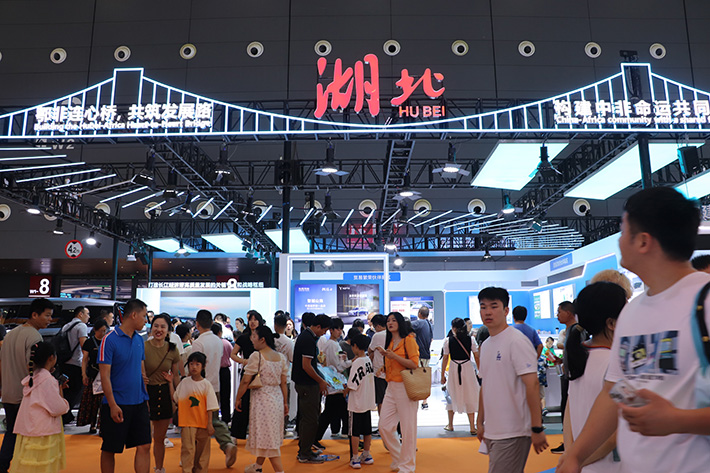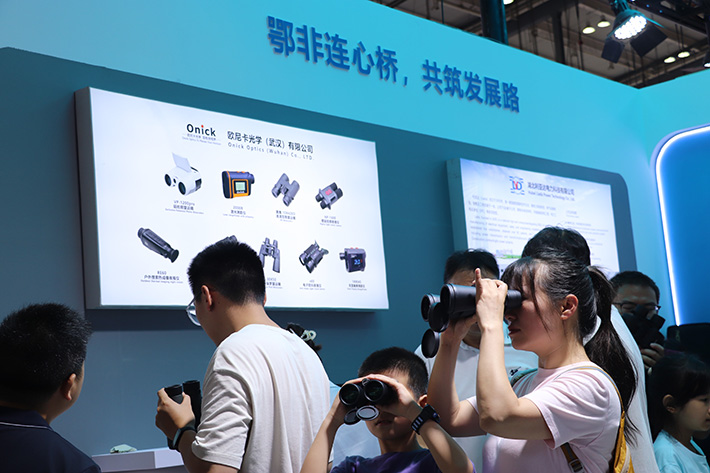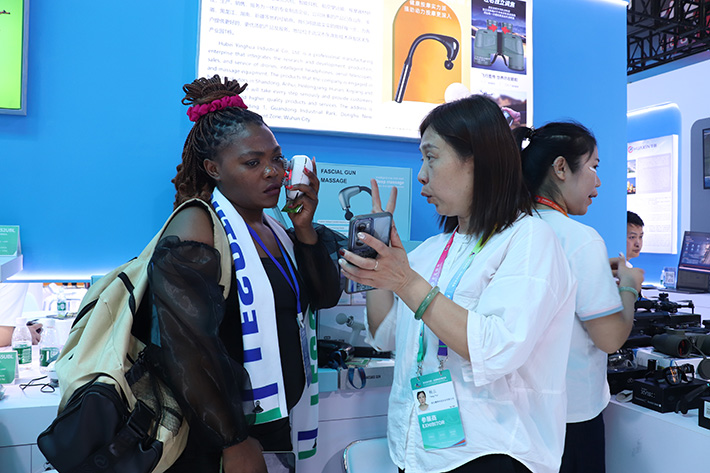|
||||||||||
| Home Top News Economy/Tech Culture/Sports China in Foreign Eyes Green Development Videos Intangible Cultural Heritages |
|
||||||||||
| Home Top News Economy/Tech Culture/Sports China in Foreign Eyes Green Development Videos Intangible Cultural Heritages |
| ChinAfrica |
| Hubei Engages Africa |
| The central Chinese province emerges as a key player in China-African trade and investment cooperation |
| By GE LIJUN | VOL. 17 July 2025 ·2025-07-01 |

The Hubei pavilion, covering 252 square metres, showcases the achievements of Hubei-Africa cooperation on 15 June (HU FAN)
The fourth China-Africa Economic and Trade Expo (CAETE) was a prime opportunity for Citygreen Sports, a Chinese supplier of synthetic turf, to boost its visibility. “Africa is one of our main markets. The expo allows us to showcase our products to African customers and engage directly with government representatives to discuss potential projects,” Wu Huan, regional director for international affairs at the group, told ChinAfrica. Based in Shishou, Hubei Province, the company notably supplied the synthetic turf for Ethiopia’s national stadium, the country’s only FIFA-certified field.
Like Citygreen, many Hubei enterprises have ventured into Africa with a common goal: weaving sustainable ties across the continent. The province took the spotlight at CAETE, with 27 companies representing strategic sectors such as new energy and intelligent manufacturing present at the expo. Since the inaugural edition in 2019, Hubei has capitalised on its central location to intensify exchanges with Africa. This international platform has helped the province to significantly expand its presence, making Hubei a leading actor among Chinese provinces in Sino-African cooperation.
A fruitful meeting
During the Hubei-Africa Economic and Trade Cooperation Fair held on 12 June during CAETE, Hubei Kangnong Seed signed a contract to export 80 tonnes of maize seeds to Angola. Grown in Hubei, these seeds will soon be sown in African soil. Based in Changyang, the company has been developing maize varieties for two decades, including the popular Kangnong No. 2, highly favoured by local farmers. “We used to export seeds, but mostly through intermediaries. This contract is our first directly managed export,” said Peng Yukan, international department director, revealing ambitions to expand to Ghana and Nigeria as well.
In the same sector, Jingzhou Meimai plans to invest over $10 million in Zambia to cultivate and process sugarcane, soybeans, and potatoes on 1,000 hectares of lands. General Manager Wan Xinjin aims to mobilise capital, expertise, and workforce from Hubei. Once operational, the project could generate up to 90 million yuan ($12.5 million) annually.
In total, eight projects were sealed by Hubei companies during the expo, totalling $1.07 billion and spanning agriculture, mining, and industry.
Cooperation also extends to the modernisation of traditional industrial sectors. Huaxin Cement made headlines by acquiring 83.8 percent of Lafarge Africa PLC in Nigeria for $980 million. The company aims to introduce environmentally friendly production technologies and expand operations to Tanzania, Mozambique, and Zimbabwe. “We will modernise existing plants and contribute to the sustainable development of local infrastructure,” stated CEO Li Yeqing.
As for Angel Yeast, a global player in yeast and biotech, the company plans to build an improved bread production line in Algeria, with a monthly capacity of 70 tonnes. “We now cover almost the entire African continent,” said Liu Yaochun, regional director for Northeast Africa, highlighting the company’s role in strengthening local agri-food industries.
The event also featured a B2B meeting space, bringing together 79 Hubei companies and 70 African firms. For many participating SMEs, it was their first step onto the international stage, carefully prepared to seize market opportunities.
The Hubei pavilion, covering 252 square metres, showcased progress in trade, industry, infrastructure, agriculture, and cultural exchange. It also hosted a presentation by the China-Africa Innovation Centre.
From its first appearance as guest province of honour in 2023, Hubei secured orders worth several billion dollars. Today, major projects born from this momentum are advancing rapidly.

Visitors try out products at the Hubei pavilion on 15 June (HU FAN)
Innovative cooperation, expanding ambitions
In 1963, Hubei sent its first medical team to Algeria, laying the foundation for 60 years of cooperation with Africa. Since then, these ties have continued to grow, evolving from one-off assistance into multidimensional partnerships spanning engineering, agriculture, trade, and investment.
According to Hubei Department of Science and Technology, innovation is now a cornerstone of this expanded cooperation. By leveraging the strategy of “major infrastructure projects + industrial modernisation,” Hubei has developed a pragmatic investment model. To date, provincial enterprises are running 311 projects in Africa, with a total value of $33.18 billion. In just the first four months this year, they signed $1.05 billion in new contracts and generated $820 million in revenue, a 72.2 percent increase year on year.
Among the flagship projects is the Caculo Cabaça Hydropower Station in Angola, built by China Gezhouba Group. Once completed, it will provide over 50 percent of the country’s electricity while creating up to 6,000 local jobs.
In agriculture, Hubei focuses on knowledge transfer. In 2007, it established the Hubei-Gaza Friendship Farm in Mozambique, the first Chinese agricultural technology demonstration centre in Africa. “Hubei doesn’t just provide capital or machinery; it also cultivates local talent,” said Maria Manuela dos Santos Lucas, Mozambique’s minister of foreign affairs and cooperation.
The momentum continues. This March, a Malawian delegation visited Edgene Biot in Wuhan, capital of Hubei Province, to learn about biotech plant breeding. Already active in Mozambique and Angola, the company now plans to introduce drought-resistant crops such as upland rice, sorghum, and sesame to Malawi, and has signed an agreement with Lilongwe University of Agriculture and Natural Resources to advance research, training, and commercialisation. “We hope to introduce gene-editing techniques to enhance Malawi’s local breeding capabilities while also helping their agricultural products access the Chinese market,” said Zou Hongfeng, the company’s vice president.
Trade is also gathering pace. According to customs data, bilateral trade between Hubei and Africa reached 16.34 billion yuan ($2.3 billion) from January to April 2025 - a 10.7-percent increase year on year. Hubei exports vehicles, electromechanical equipment, and textiles, while importing mineral resources, essential oils, and works of art.
As a symbol of this dynamism, on 24 May, a special “coffee flight” by Ethiopian Airlines landed at Huahu Airport in Ezhou in Hubei, carrying 66 tonnes of Ethiopian coffee - the equivalent of 5 million cups. The air transport, far faster than sea freight, enabled distribution across China the very next day. Since the Ezhou-Addis Ababa route opened in 2024, the airline has transported 13,000 tonnes of goods, including both African agricultural products and Chinese manufactured goods. A joint logistics platform in Addis Ababa has cut e-commerce delivery times by 30 percent.

An African visitor explores products from a Hubei company at the fourth China-Africa Economic and Trade Expo on 13 June (HU FAN)
Industrial cooperation is also on the rise. In South Africa, the local subsidiary of Yangtze Optical Fibre and Cable Joint Stock Ltd. Co. now manufactures optical cables domestically, boosting the country’s telecom infrastructure. In 2023, its turnover there reached 116 million yuan ($16 million).
Many Hubei companies are exporting cutting-edge technologies and management expertise, deepening Sino-African ties. “We hope to strengthen cooperation in key fields such as advanced manufacturing, modern agriculture, digital technologies, artificial intelligence, and new energies, so as to jointly power new engines of development,” said Long Xiaohong, director of Hubei Department of Commerce.
| About Us | Contact Us | Advertise with Us | Subscribe |
| Copyright Beijing Review All rights reserved 京ICP备08005356号-5 京公网安备110102005860号 |